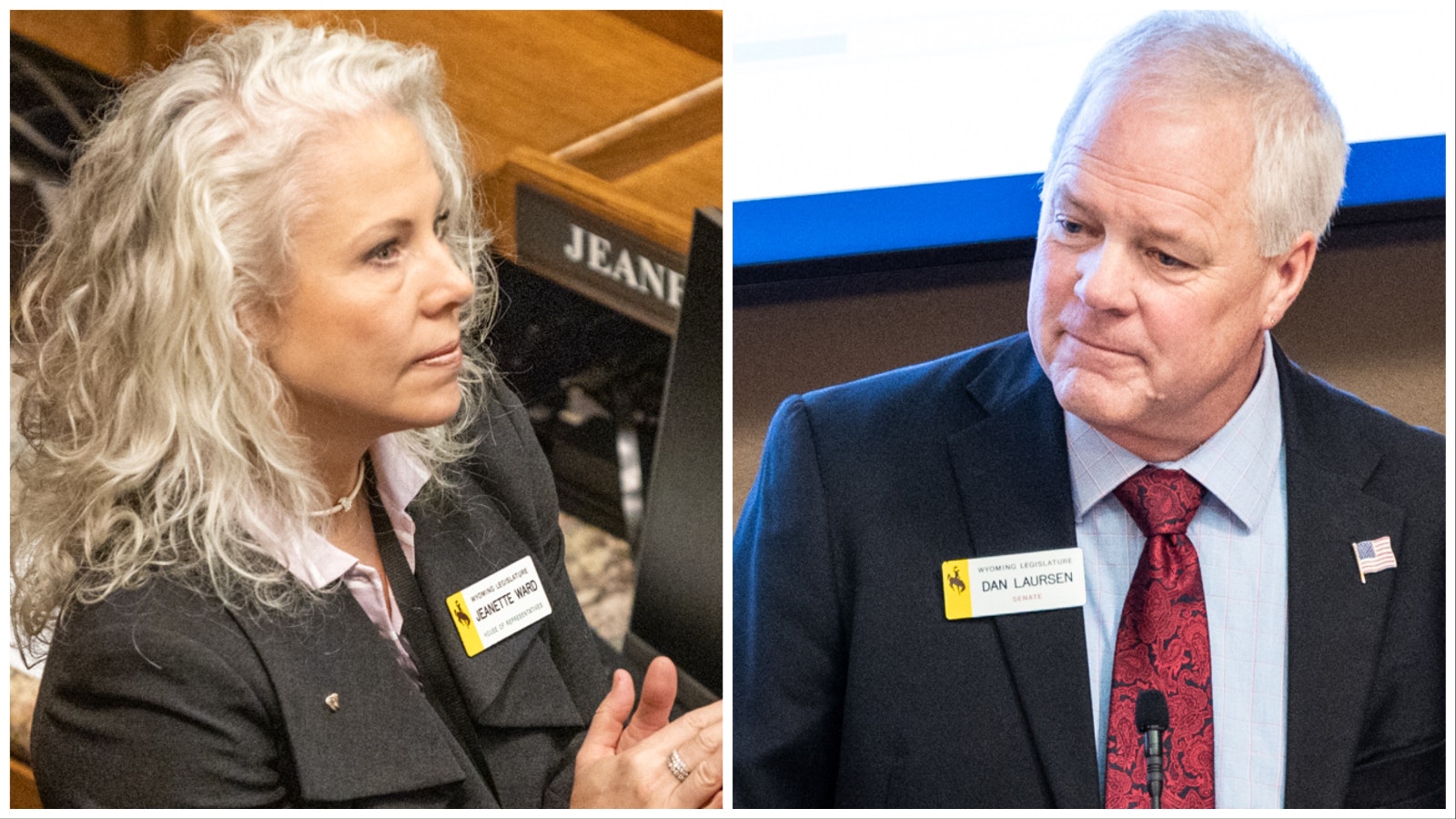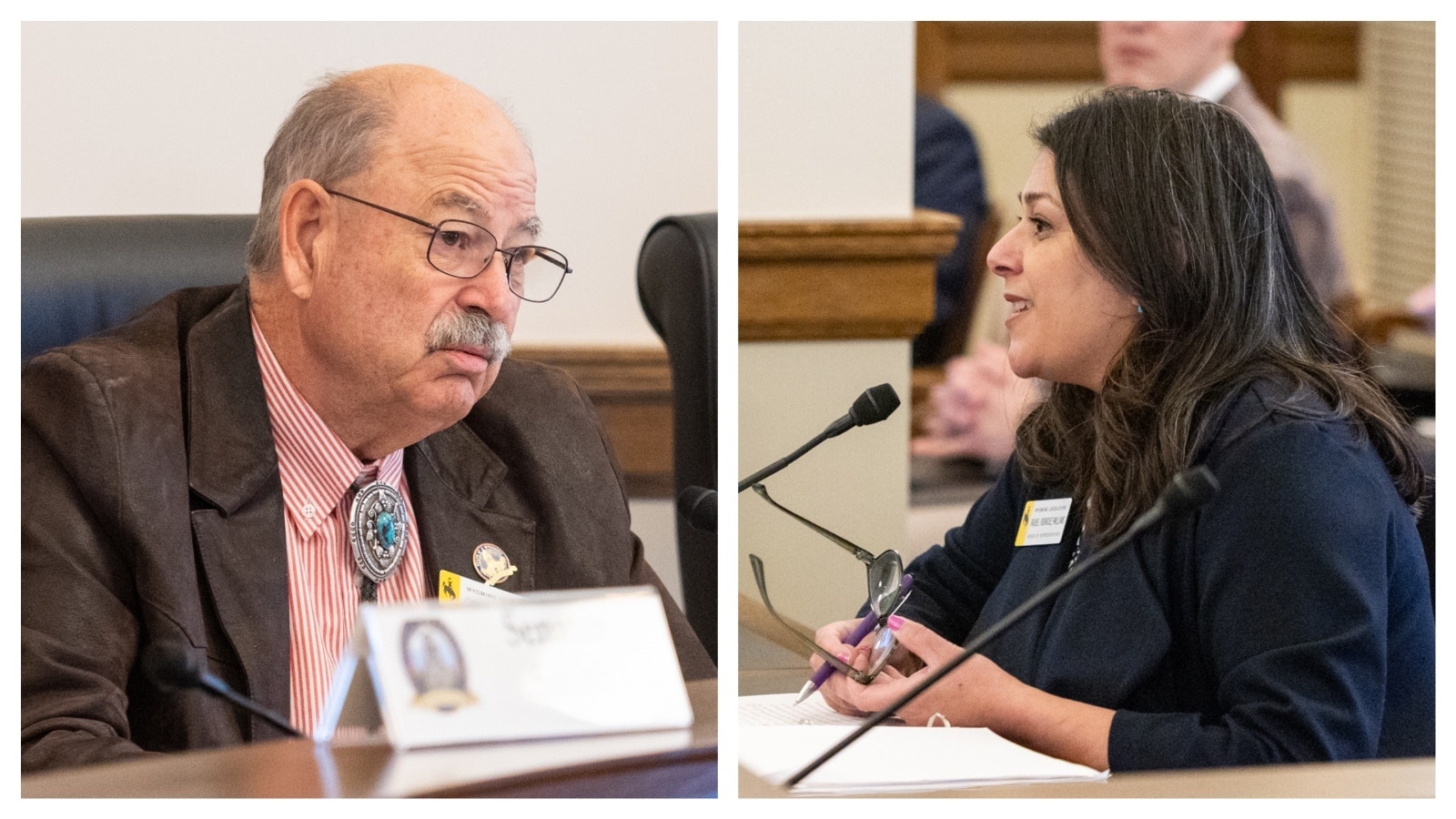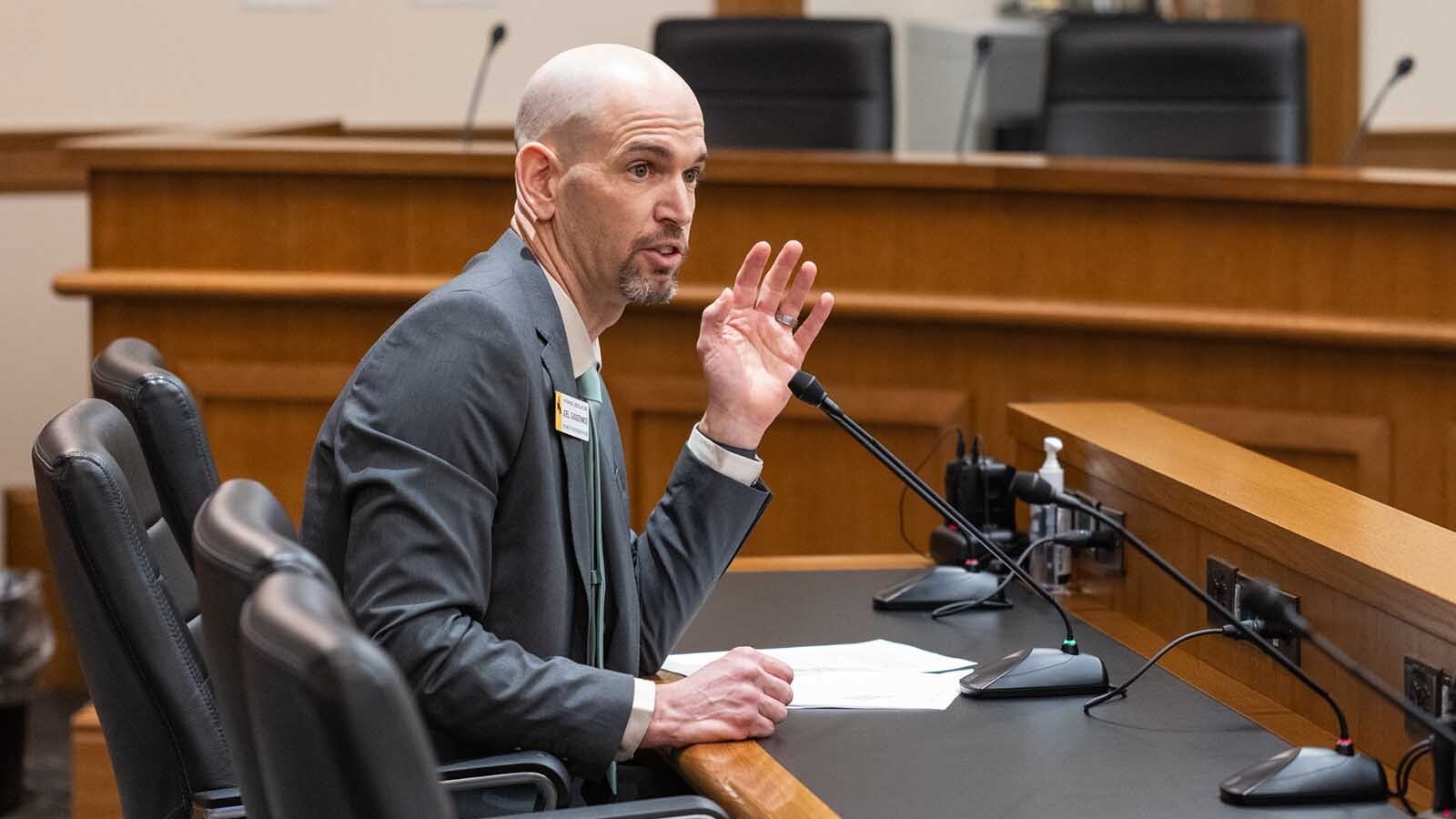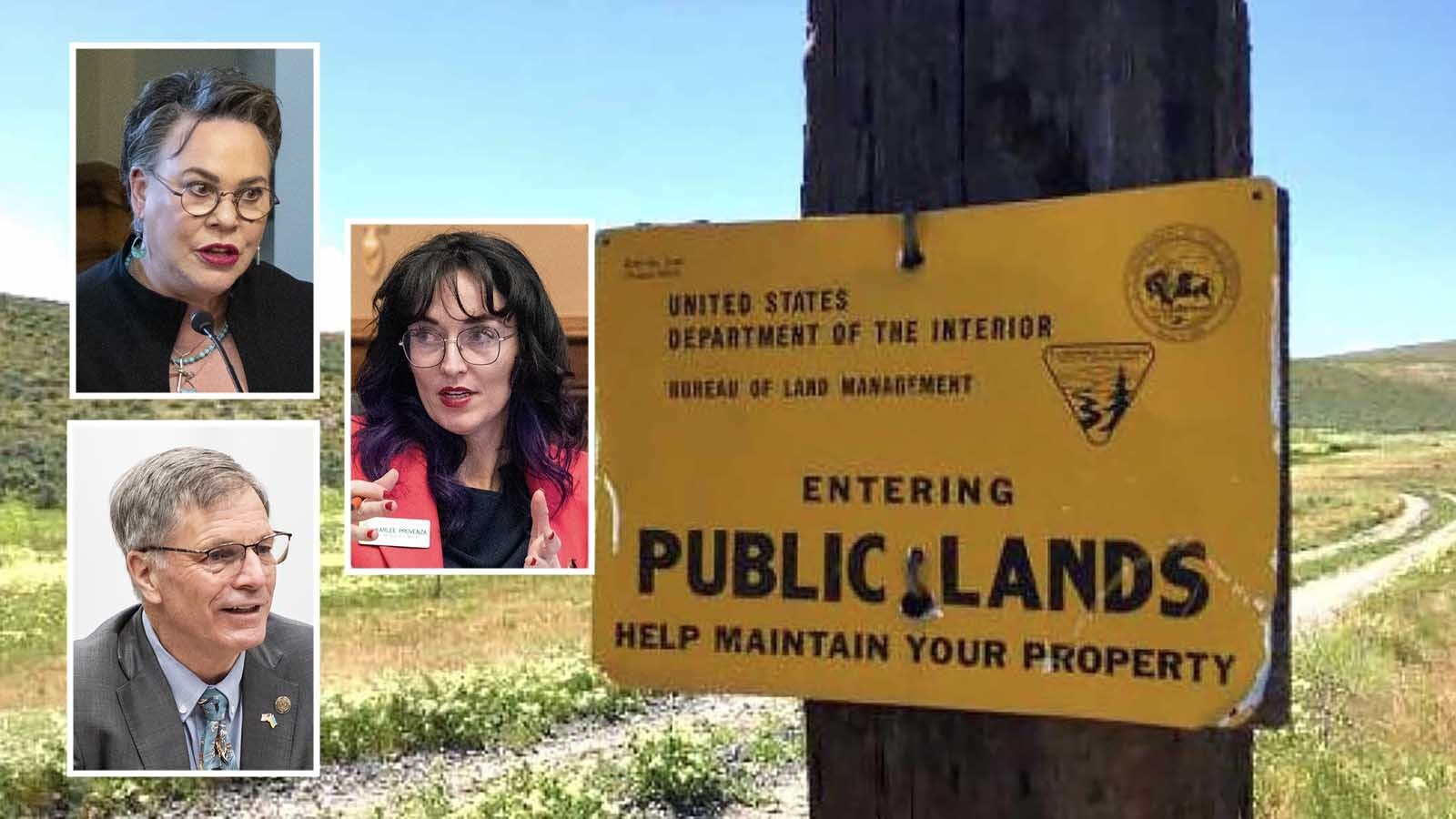“Copy-and-pasted,” “template,” “cookie-cutter” and “national agenda.”
Those are just a few of the ignominious ways some have described legislation this year’s Wyoming Legislature considered that had their origins from out-of-state sources.
But many longtime lawmakers tell Cowboy State Daily that the practice of drafting bills inspired – or even fully written – by other states and outside groups is nothing new.
“It’s been happening ever since I can remember,” said state Sen. Charles Scott, R-Casper, the longest serving member of the Wyoming Legislature. “There are plenty … of national groups that provide model acts, and we utilize them quite heavily.”
The only difference, Scott said, is there may be less “massaging” of bills taking place than in year’s past – the effort made to mold proposed legislation to existing laws and the Wyoming Constitution.

Follow A Template Or Do It Yourself?
Those in Wyoming who have opposed legislation directly brought from other states have mentioned the Cowboy State’s sparse population and relatively unique culture as to why proposed legislation should be crafted locally.
Bill McIlvain, 90, served in the Wyoming House for 18 years, including a stint as speaker from 1989-1990. He said there were many pieces of legislation brought from other states during his time.
He said the practice doesn’t have to be used in a way where Wyoming lawmakers are taking their marching orders from outside interests or other states. Comparing work others have already done often means not having to spend time doing some of the same work.
“It’s kind of like, why rediscover the wheel?” said McIlvain. “You redo it and massage it for Wyoming.”
David Miller, a Fremont County legislator who served from 2001-2021, also supports this practice as long as bills are tailored for Wyoming.
“Sometimes people bring canned bills,” he said. “We are quite a bit different than New York, New Jersey, Arizona. Without changes, these bills are not necessarily very good for Wyoming.”
Rex Arney, who served in the Legislature from 1973-1988, said directly pulling legislation from other states and pasting it into Wyoming bills without changes is an unsavory practice.
“Things are different in different states,” he said. “Trying to take from another jurisdiction and trying make it work here, I don’t think it’s good.”
Besides possibly not being right for Wyoming, using these “cookie-cutter” templates leads to other problems for lawmakers, Arney said.
“It tends to create factions, division,” he said.
Recent Examples
The issue has drawn so much attention of late that Gov. Mark Gordon weighed in on it during a press conference last week, and in two closing speeches he made to the Wyoming House and Senate on March 3.
“It’s OK to be informed by what action is taken in other states. We can bring model legislation here,” he said last week. “It’s fine to read those, it’s fine to understand those. But they should be tailored to Wyoming, and they shouldn’t be driven through as a, ‘Here’s the model, this is what (Washington) D.C. told us.’”
Gordon recently signed Senate File 174 into law, which creates an eight-person board to review, authorize and oversee charter schools. Gordon said this bill “kept getting sort of derailed by national interests” throughout the legislative process.
“I’m glad we came to a conclusion there, it seems to be Wyoming-centric, at least more so,” he said of how the bill worked out.
There also was a noticeable trend of bills brought this year relating to national-level issues such as transgender rights and the teaching of sexual orientation and gender identity in public schools.
Some state lawmakers used these other legislative efforts as justification in their arguments as to why their bills should pass. When they didn’t, it was used as part of a larger overarching argument that Wyoming isn’t as conservative as some may perceive it to be.
Senate File 133, which prohibits biological males from competing in girls’ sports, was at least inspired by legislation brought in other states, although there are very few transgender athletes in Wyoming.
Also, the Wyoming High School Activities Association’s existing policy on transgender athletes leaves it up to individual schools to determine eligibility when making these types of reviews. No decisions have ever been appealed.
SF 133 ultimately passed the Legislature and is on Governor Gordon’s desk. He has until the end of day Saturday to sign, veto or allow it to become law without a signature.

Cheyenne Republican Sen. Anthony Bouchard’s “Chloe’s Law” also drew significant attention this year. This legislation, Senate File 144, would have prohibited Wyoming doctors from performing gender-related surgeries and other treatments on minors.
Bouchard said although he based the bill on laws in a few other states, he gave directives to Legislative Service Office staff to craft the legislation for Wyoming.
House Speaker Rep. Albert Sommers, R-Pinedale, said legislation that would have given parents state money to put their children in private schools or homeschool them was another that originated from out-of-state sources.
Another example is House Bill 152, which prohibits most forms of abortion in Wyoming. It was drafted through a combination of in-state and out-of-state attorneys.
“The issues are fine to debate, but I do worry about ultimately, this national pressure pushing in on legislators,” he told Cowboy State Daily on March 3.
Scott said House Bill 62, which authorizes state-chartered banks to participate in open banking under certain stipulations, also was copied from another state.
Gordon signed this bill into law.
‘Wyoming Solutions For Wyoming Problems’
Sommers expressed general aversion to national influences being involved in Wyoming’s political business, reiterating multiple times during the end of the 2023 session that he supports “Wyoming solutions for Wyoming problems,” a phrase also repeated by Gordon.
“This national movement to bring national legislation, like the stuff from all states, to bring that into the state, I think that’s not a good outcome,” Sommers told Cowboy State Daily on March 3. “I think the issues are fine. We can debate those.
“But I think national movements to push these into states, it’s not how we’ve done business in Wyoming before.”
In a Tuesday column submitted to Cowboy State Daily, Rep. Rachel Rodriguez-Williams, R-Cody, said the “Wyoming solutions for Wyoming problems” phrase “quickly became the go-to method for killing honest debate on any issue.”
She said some of the same legislators using that as a rallying cry also supported amendments to the Uniform Trust Code that were written by out-of-state attorneys and the Federal Indian Child Welfare Act, which was copied and pasted from federal statutes and is being challenged before the U.S. Supreme Court.

Freedom Caucus Perspective
Many of the bills that originated outside Wyoming this year were sponsored by members of, or aligned with, the hardline conservative Wyoming Freedom Caucus, like Rodriguez-Williams.
The Freedom Caucus is organized under the umbrella of the Washington, D.C.-based State Freedom Caucus Network.
There were a considerable number of votes in this year’s House split between Freedom Caucus members and the rest of the body.
Rep. Karlee Provenza, D-Laramie, remarked that it hadn’t always been like that, but still thought there were positive gains from the recently completed session.
“There’s still good work being done when people from Wyoming get their heads together and work on something with what we have here instead of bringing a piece of paper they printed off from somewhere else,” she said.
Rep. John Bear, R-Gillette, chairman of the Wyoming Freedom Caucus, defended using bills from other states as templates and called Gordon’s criticism of the matter “arrogant.”
“It’s pretty arrogant to think that all bills made out of a state would be a bad fit for Wyoming,” he told Cowboy State Daily on March 3.
Many conservatives like Bear have argued that even if an issue isn’t happening commonly or at all in Wyoming, it’s important to get ahead of problems before they start. He said many issues hit other states first because of their larger populations, giving smaller states like Wyoming time to weed out problems and address issues through legislation.

Write Makes Right
Sommers said when he first entered the Legislature in 2013, nationally inspired bills came up “once in a while,” but no more than about one a year.
Miller said he also saw a smattering of these template-type bills in the past, but they didn’t tend to have much success.
He said he brought a few himself, such as legislation guaranteeing the state access to its natural gas resources under a national emergency, nicknamed the “doomsday bill” by its detractors.
Sommers said he’s open to taking ideas from other states and has had LSO staff provide information on what other states are doing on certain topics, a practice Miller said the department often employs.
“But in the end, you write the bill,” Sommers said. “You write it here. It just doesn’t come as a template. I do think they (bills written outside the state) struggle because we do have a different Constitution. Not every constitution is the same.”
Sommers said some legislators take the approach of aggressively lobbying their bills through, but he expressed doubt that this is the best way to get bills passed. He offered a comparison to a slow-cooked meal, baking the bill’s ingredients over the interim summer meetings and letting it marinate into the winter session.
“A more thoughtful approach that takes a little more time,” he said. “You get more public buy-in, you find out the hiccups, you find ways to solve the little problems in the bill.”
Sen. Bo Biteman, R-Ranchester, mentioned during the session how one of his anti-environmental, social, and corporate governance bills was based on a law Texas passed two years ago.
This legislation would have prevented the state from investing in companies that participate in boycotts based on ESG scores. He said his version of the legislation was “tweaked” to fit Wyoming statutes.
Members of the House Appropriations Committee didn’t agree Feb. 21, finding faults with multiple aspects of Biteman’s bill when it came to the way it was written. At one point Rep. Tom Walters, R-Casper, criticized an aspect Biteman defended as “a placeholder.”
“By now, that should be buttoned down,” Walters said. “I don’t see that as a placeholder.”
National Memberships
McIlvain mentioned how many lawmakers are members of national organizations that bring state legislators together to talk about issues.
One prominent group a number of Wyoming legislators are involved with is the American Legislative Exchange Council, a right-leaning organization heavily funded by some of America’s largest corporations.
It’s not surprising that certain bills get brought up during these national meetings, which then sometimes find themselves in other members’ states later down the road.
McIlvain mentioned one close relationship he kept with a Republican Colorado lawmaker he routinely shared ideas with.
“In the leadership, you get together with legislators all around the country,” he said. “You visit with organizations and bring up ideas. You don’t go about it to intentionally steal other people’s ideas. You just take a look at all things.”
He and Arney said Wyoming also gave bills to a number of different states during their time.
“In a few states, it prompted them to take action based on what they were seeing in Wyoming,” Arney said.
Arney said certain organizations like the American Bar Association and Uniform Law Commission push template bills not to necessarily further an agenda, but to bring legislation that creates uniformity between different states’ laws.
He also said there has been increased pressure on legislators from national organizations and lobbying groups in recent years.
Sommers said he felt this in the recent session, but is unsure what it means for the future of the Legislature.
Scott said he expects lawmakers will keep taking bills from other states.
“There’s nothing wrong with plagiarizing a bill from another state,” he said. “Just make sure you’re plagiarizing the right thing for Wyoming.”





